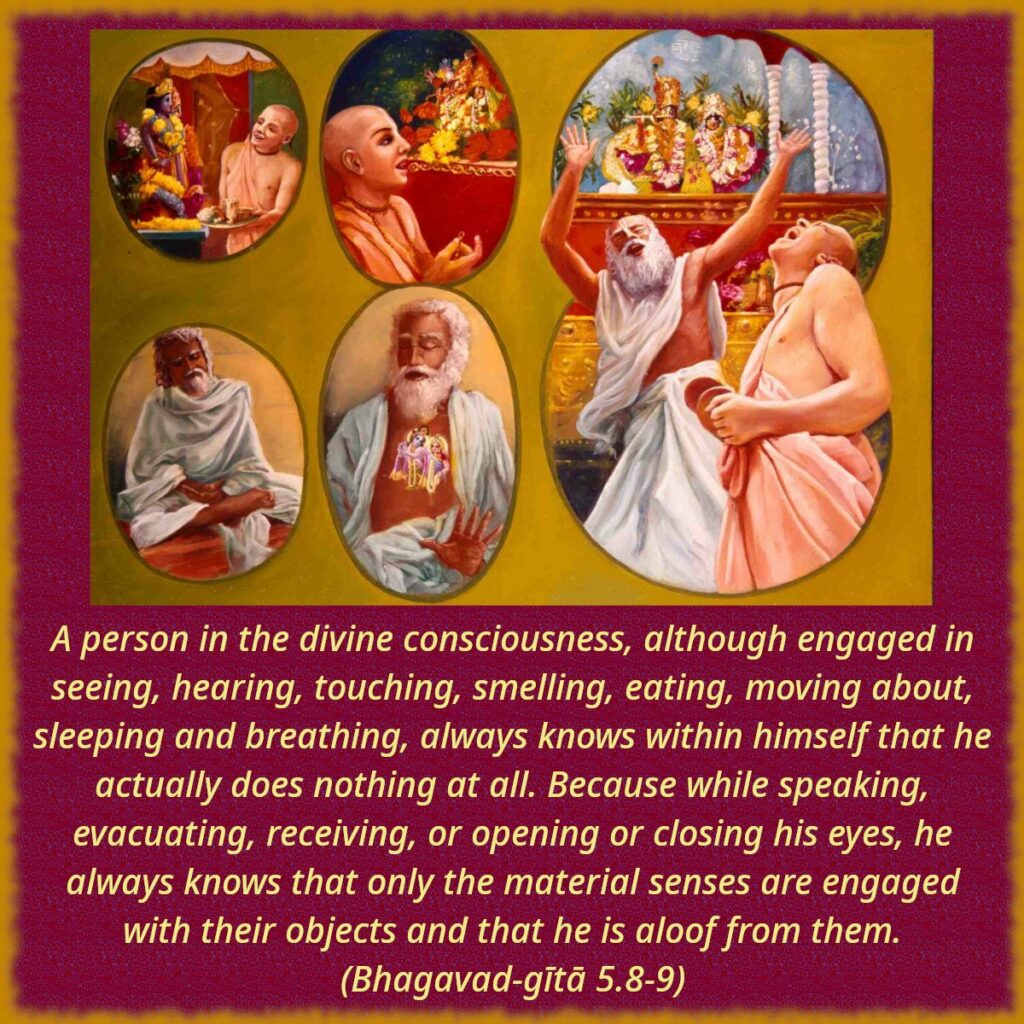नैव किञ्चित्करोमीति युक्तो मन्येत तत्त्ववित् |
पश्यञ्शृण्वन्स्पृशञ्जिघ्रन्नश्नन्गच्छन्स्वपञ्श्वसन् || 8||
प्रलपन्विसृजन्गृह्ण्न्नुन्मिषन्निमिषन्नपि |
इन्द्रियाणीन्द्रियार्थेषु वर्तन्त इति धारयन् || 9||
naiva kiñchit karomīti yukto manyeta tattva-vit
paśhyañ śhṛiṇvan spṛiśhañjighrann aśhnangachchhan svapañśhvasan
pralapan visṛijan gṛihṇann unmiṣhan nimiṣhann api
indriyāṇīndriyārtheṣhu vartanta iti dhārayan
na—not; eva—certainly; kiñchit—anything; karomi—I do; iti—thus; yuktaḥ—steadfast in karm yog; manyeta—thinks; tattva-vit—one who knows the truth; paśhyan—seeing; śhṛiṇvan—hearing; spṛiśhan—touching; jighran—smelling; aśhnan—eating; gachchhan—moving; svapan—sleeping; śhvasan—breathing; pralapan—talking; visṛijan—giving up; gṛihṇan—accepting; unmiṣhan—opening (the eyes); nimiṣhan—closing (the eyes); api—although; indriyāṇi—the senses; indriya-artheṣhu—in sense-objects; vartante—moving; iti—thus; dhārayan—convinced
Translation:
The harmonised yogi who knows the essence of things, thinks “I do nothing”, seeing, hearing, touching, smelling, eating, moving, sleeping, breathing, speaking, giving, grasping, opening, and closing the eyelids even. He is convinced that the senses move among the objects of the senses.
Commentary:
The attitude of the man of perfect Knowledge is explained here. Atma is the witness of all phenomena. Just as the sun is only a witness to the various human actions that take place in the light that he sheds, just as the lamp is only a witness of the actions taking place in its light, Atma is just a witness of the activities of the body, the senses, and the mind, which take place by His all-pervading life-force. It remains untainted by them, ever pure and ever perfect.
To realise one’s own identity with Atma is the perfection of Knowledge.
In fact, there is only Atma, and the apparent existence of the individual-self is fiction. It is non-existent, and yet appears to exist. Ignorance (avidya) covers up the reality, and has imposed a fictitious sense of separateness on man, and so the thinks of himself as Jiva, separate from Paramatma. It is like the wave imagining itself to be separate from the ocean.
The Jiva, having imagined that he is a separate entity, identifies himself with the body, senses and mind. When the bodily organs are moving and acting, when the mind thinks and feels, he thinks that he is thinking and feeling. When the senses function in their own respective sense objects, he thinks that he is functioning. This body – identification is caused by ignorance. By spiritual sadhana and knowledge the wise man discovers the tremendous error of body-identification (dehatmabuddhi) and regains his original state of Atma. When dehatmabuddhi is removed, Atmabuddhi is achieved. In that state, the body, senses, and mind and all their functions and actions, are perceived as distinctly separate from the Self.
Pretensions to Jnana is a dangerous tendency. Since Atma is beyond all laws and since the Jiva is no other than Atma, it is quite possible for pretenders to be plunged in the mire of sense – pleasures, and claim immunity from and yet om them by simply repeating the slogan ‘I do not anything’. The Lord has declared the conditions of Jnana with perfect clarity. The Jnani who could say ‘I do not anything’ should be one whose heart is purified (visuddhatma) and whose senses are subdued (Jitendriyah). Of what avail is to say ‘I do not anything’, when at every step one is identifying himself with all the pleasures of the body and the senses? Let the seeker carry out a thorough search into a search into their own hearts and find out the taints and blemishes of lust, greed and hatred. Let these sins be purified first through Nishkamakarma, and then only the seekers would be fit to enter the plane of the pure Knowledge of the Self.
From Tamas to Rajas, from Rajas to Sattva, and from Sattva to pure Sattva, from the lower to the higher the seeker has to rise gradually. One who has reached the state of pure Sattva cannot be drawn by the senses to indulge in the common pleasures of the body. His mind cannot dwell on worldly matters. His words do not smack of worldliness in any manner. In word, thought and deed, he is pure, nay purity is his He lives constantly in the light and bliss o of Brahman, he never more shall be diverted by the illusion of worldly enjoyment. Would a man who has awakened from his sleep think of and run after the pleasures of the dream? He knows that they are false and delusive. So would the Jnani understand that all the pleasures which he had in the past were only the reflections of a mirage, and he has been fooled too frequently by mistaking the apparent to be the Real. So he is careful to remain steadfast in the Self. It is only such a man of Self-knowledge who can say – ‘I do not anything.’ Such men have done great work for the good of humanity, without the least trace of personal doership.
So, first of all, by the practice of Nishkama Karma, devotion to God, Dhyana, the heart should be purified and the Self should be realised through direct experience. Then whether he works or not, he is not bound in any way. The mind, like a burnt seed, is void of producing any reactions. He sees and knows the whole of the phenomenal world and all his actions in it are only dramatic performances taking place in His presence, while he remains only a spectator.
Question: What is the attitude of the sage of wisdom towards bodily and mental activities?
Answer: He knows that the senses move in the sense-world, and he has a clear idea ‘I do not anything.’
Bhagavad Gita: Chapter 5 🔻 (29 Verses)
